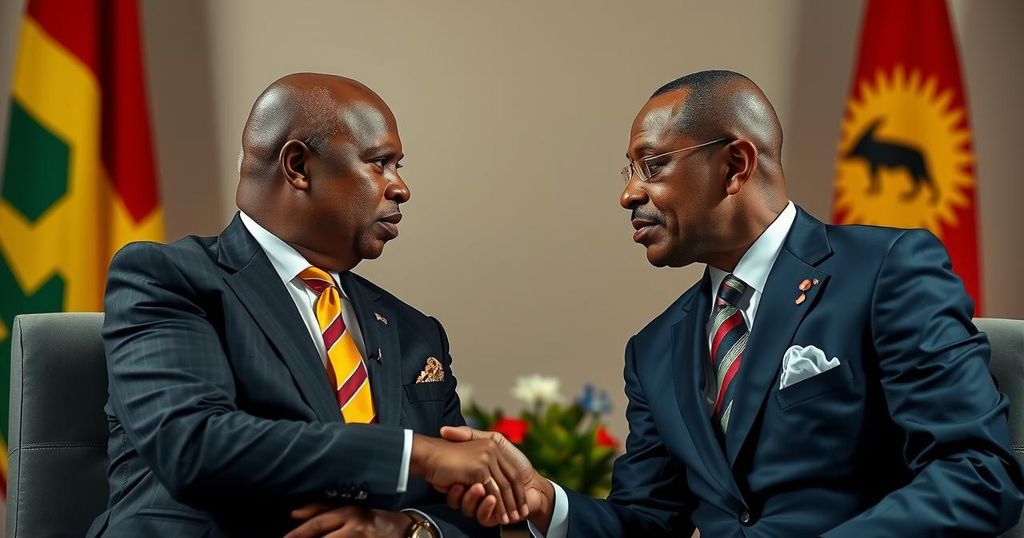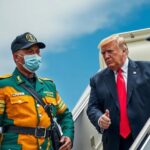Mnangagwa Engages Botswana’s New President to Rebuild Bilateral Relations
Zimbabwean President Emmerson Mnangagwa met Botswana’s new leader, President Duma Boko, to redefine bilateral relations after Boko’s election victory. This meeting aimed to rebuild trust and promote cooperation amid changing regional political dynamics, highlighting a shift away from traditional liberation movements and focusing on shared interests despite inherent political differences.
President Emmerson Mnangagwa of Zimbabwe recently met with Botswana’s newly elected leader, President Duma Boko, during World Children’s Day celebrations held in Victoria Falls. This meeting serves as Mnangagwa aims to redefine Zimbabwe and Botswana’s diplomatic relationship following the unexpected electoral success of Boko’s Umbrella for Democratic Change, which ousted Mnangagwa’s long-time ally, former President Mokgweetsi Masisi. The new political dynamics have compelled Mnangagwa to recalibrate his approach towards Botswana. Boko’s victory represents a profound shift in Botswana’s political landscape, marking the end of nearly sixty years of dominance by the Botswana Democratic Party. This transition unsettled Mnangagwa, as evidenced by his delayed congratulatory message to Boko, indicating the electoral results’ implications for Zimbabwe-Botswana relations. According to a source familiar with the meeting, the discussions were aimed at fostering trust between both nations. “President Mnangagwa recognised the need to engage President Boko early to ensure strong cooperation between the two nations,” the source noted. The leaders discussed key areas of mutual interest such as trade, border management, security collaboration, and economic partnerships, demonstrating their commitment to strengthening bilateral ties despite political differences. The rise of Botswana’s opposition further underscores the challenges faced by entrenched political parties across Southern Africa, posing a potential threat to the legacy of liberation movements like Zimbabwe’s ZANU-PF. This changing political landscape was evident during Boko’s inauguration, where opposition figures received greater acclaim compared to long-standing leaders like Mnangagwa and Masisi. Mnangagwa’s previous experience with Zambian President Hakainde Hichilema serves as a cautionary tale in this context. The diplomatic strain that emerged due to Mnangagwa’s delayed recognition of Zambia’s new leadership highlighted the necessity of timely engagement with counterparts. To avoid repeating past errors, Mnangagwa acted quickly to consolidate relations with Boko, signaling a pragmatic approach to diplomacy. The dialogue between the two leaders highlighted the need for practical cooperation, placing a focus on alleviating border trade challenges, fostering economic collaboration, and addressing pressing security issues. An insider remarked, “This was a necessary conversation to ensure that regional stability and economic cooperation are not disrupted by political differences.” This engagement signifies a critical juncture in the evolving political dynamics of Southern Africa, as historical leaders such as Mnangagwa navigate relationships with newer opposition-driven governments. As both countries confront regional and domestic challenges, their ability to maintain functional partnerships, irrespective of ideological divides, will be essential for navigating the complexities of their bilateral relations.
The context of this article revolves around the recent political dynamics in Southern Africa, particularly focusing on the shifting power dynamics within Botswana following the election of President Duma Boko. His party, the Umbrella for Democratic Change, managed to unseat the long-standing Botswana Democratic Party, thereby altering the political landscape in a region traditionally dominated by liberation movements. This change poses new challenges for leaders like Zimbabwe’s President Emmerson Mnangagwa, who must reassess diplomatic strategies in light of a new opposition that is gaining ground and popularity across the region.
In summary, President Mnangagwa’s meeting with Botswana’s President Boko signifies a new era in diplomatic relations between the two nations, driven by the recognition of shifting political landscapes within Southern Africa. The swift engagement, aimed at rebuilding trust and fostering collaboration, demonstrates a tactical approach to navigate regional challenges. As both leaders prioritize shared national interests over ideological differences, this meeting could pave the way for enhanced cooperation in trade, security, and economic development amidst evolving political dynamics.
Original Source: www.thezimbabwemail.com








Post Comment